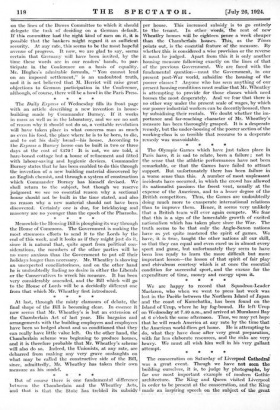But of course there is one fundamental difference between the
Chamberlain and the Wheatley Acts, and that is that the State 'has trebled its subsidy per house. This increased subsidy is to go entirely' to the tenant. In other words, the rent of new Wheatley houses will be eighteen pence a week cheaper than the Chamberlain houses. This, as the Times points out, is the essential feature of the measure. By whether this is considered a wise provision or the reverse it must be judged. Apart from this it is only another housing measure following exactly on the lines of that of the previous Government. We are faced. with . the fundamental question-must the Government, in our present post-War world, subsidize the housing of the poorer classes ? Anyone who has seen anything of our present housing conditions must realize that Mr. Wheatley is attempting to provide for those classes which need houses the most desperately. And' we fear that there is no other way under the present scale of wages, by which our poorer industrial workers can be decently housed, than by subsidizing their rentals. We doubt whether the im- portance and far-reaching character of Mr. Wheatley's measure has been thoroughly grasped. It is a desperate remedy, but the under-housing of the poorer section of the working-class is so terrible that recourse to a desperate remedy was unavoidable.
* *


















































 Previous page
Previous page